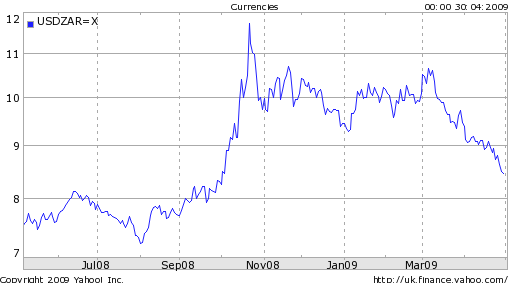May 1st 2009
South Africa Hikes Rates, but Interest Rate Differential is Preserved
Yesterday, the South African Reserve Bank (SARB) lowered its benchmark interest rate by 100 basis points to 8.5%. Since December, the Central Bank has now cut rates by 3.5%, from a high of 12%. [As an aside, the SARB uses a repo rate to conduct policy, as opposed to a discount rate. In theory, a repo rate is slightly unique in that it reflects the rate at which the Central Bank will repurchase government securities from commercial banks. The Federal Funds Rate, in contrast, “is the interest rate at which private depository institutions (mostly banks) lend balances (federal funds) at the Federal Reserve to other depository institutions.” In practice, both rates function as modulators of liquidity in the financial system.]
“The outlook for domestic economic growth remains subdued, with no indications of a quick recovery,” offered the SARB as a rationale for the rate cuts. Activity in manufacturing and mining, two of the cornerstones of the South African economy, have plummeted since the inception of the credit crisis, along with exports and retail sales. As a result, “Central bank Governor Tito Mboweni said April 7 he would ‘not be surprised‘ if the nation’s economy shrank for a second consecutive quarter in the three months through March, following a 1.8 percent contraction in the fourth quarter.” Meanwhile, South Africa’s producer price index (PPI) has declined for seven consecutive months. Coupled with a moderation in food and energy prices, inflation is no longer perceived as a serious problem.
The South African Rand actually rose on the news of the rate cut, as part of a trend that has seen the currency rise nearly 40% since touching a low of 11.7 Rand/Dollar in October. In April alone, “South Africa’s rand, the laggard of 27 major world and emerging-market currencies last year, rallied 12 percent against the dollar.” This reversal of fortune is due largely to the recovery of risk appetite and consequent return of investors to the carry trade.

South Africa is especially poised to benefit from this trend for a couple reasons. Primarily, the Rand’s advantage lies in in interest rate differentials. Even if the SARB hews to economists’ predictions and cuts its repo rate by another 100 basis points, the differential will still be tremendous, as virtually every industrialized country has lowered rates close to zero. In addition, South Africa is perceived as a relatively safe place to invest, especially relative to interest rate levels. According to one trader, “We’re seeing a re-assessment of the rand’s relative value because of the fact that South Africa’s economy and financial system are relatively more sound than is the case in many other countries.”
As Bloomberg News summarized, you can’t stand in front of a freight train: “Emerging-market stocks are poised for their best month in 20 years as evidence the global recession is easing spurs investor demand for higher-yielding assets.”
In the end, you can’t fool the markets and carry traders ignore fundamentals at their peril. The recent election of Jacob Zuma as South African Prime Minister “hardly adds to confidence in the South African economy.” In addition, South Africa continues to maintain a sizable current account imbalance, “at 7.4 percent of gross domestic product last year.” Despite declines in February and March, the deficit touched a “record 17.380 billion rand deficit in January” and the markets are “expecting large deficits to persist this year as exports come under pressure.”



